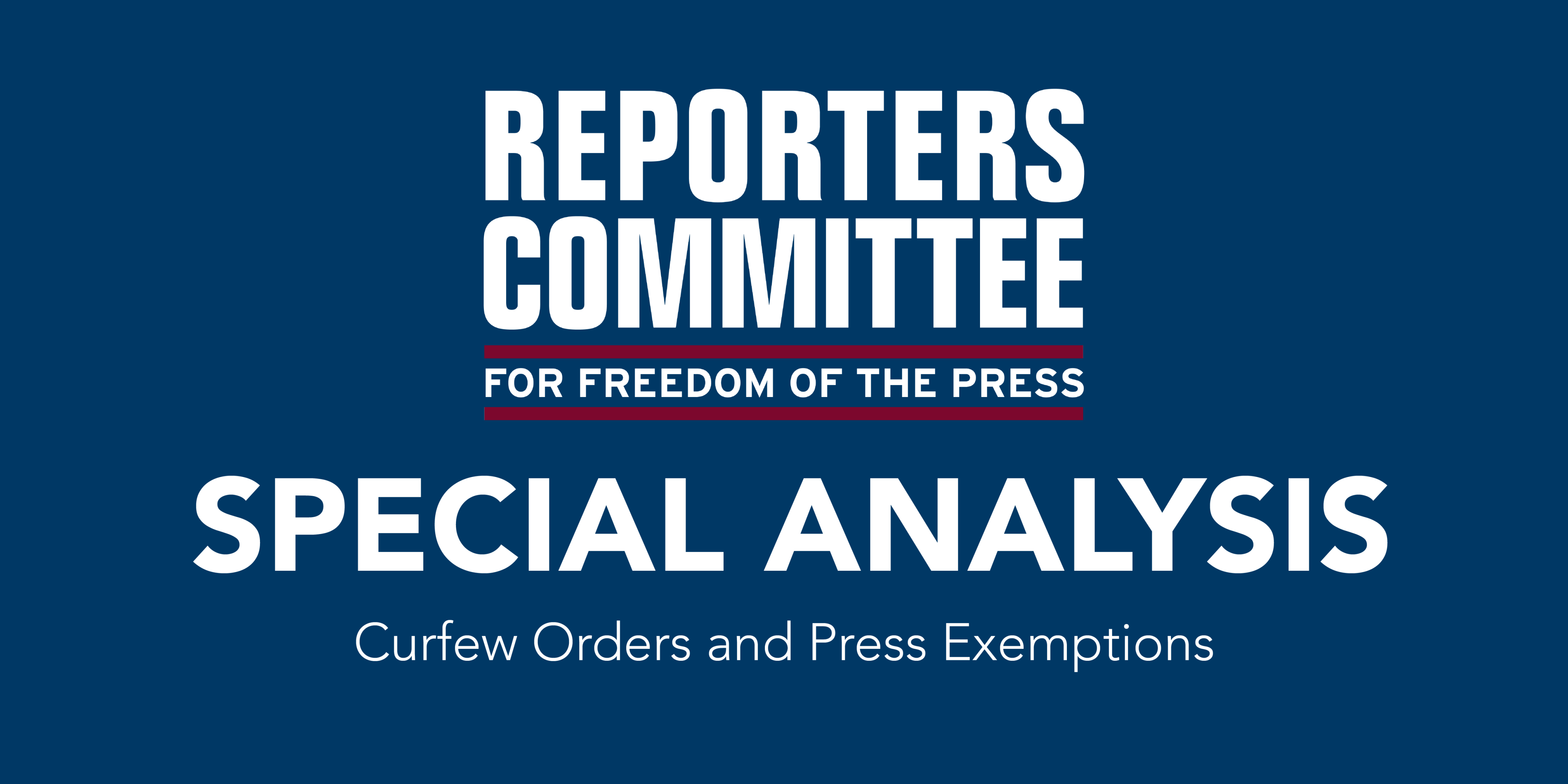Curfew orders without media exemptions may be unconstitutional under First Amendment

State, county, and city governments have enacted curfew orders in response to nationwide protests against police violence and racial injustice that erupted after the May 25 killing of George Floyd, a Black man, by a white Minneapolis police officer. In some cities, as a result, police are targeting journalists for violating curfew — regardless of whether the media are exempt from curfew orders in their jurisdiction.
For example, on May 31 in San Jose, California, police wielding batons forced journalists Maggie Angst and Luke Johnson to the ground and did not tell them they were free to go after they had shown their credentials and explained that members of the media were exempt from curfew. At a June 1 protest in Columbus, Ohio, three student journalists for the Ohio State Lantern “were pepper-sprayed by police after clearly stating that news media are exempt from the citywide curfew.” And on June 2, New York City police surrounded, shoved, and verbally harassed Associated Press journalists May-E Wong and Robert Bumsted, forcing them to leave the protest despite a clear media exemption from the mayor’s curfew order.
The Reporters Committee is tracking curfew violation incidents involving the news media. An analysis of the incidents shows a troubling trend of law enforcement arresting, detaining, pepper-spraying, or tear-gassing journalists who clearly identified themselves as members of the press.
The majority of these incidents occurred in jurisdictions with media exemptions, which enabled journalists who were detained or arrested to resolve the issue by having their editors or counsel reach out to authorities. But some occurred in places where the relevant curfew order contained no media carveout.
Below, the Reporters Committee explains the constitutionality of curfew orders without explicit press exemptions by examining relevant case law and policy considerations underlying the First Amendment.
In short, while there are no previous cases in which emergency curfew orders have been challenged for lacking media exemptions, related cases suggest that curfew orders that do not contain press exemptions may be unconstitutional under the First Amendment.
How courts decide whether curfew orders are constitutional
Courts apply a specific test to determine whether any restriction on the time, place, and manner of expressive conduct in a public space is reasonable under the First Amendment. According to the U.S. Supreme Court, a court reviewing any challenge to a curfew order will examine whether it is “content neutral,” “narrowly tailored to serve a significant governmental interest,” and “allow[s] for ample alternative channels for the expression.”
The curfew orders are content neutral in that they apply to everyone equally, regardless of their message. However, it is clear that a curfew order without a press exemption does not provide “ample alternative channels for the expression,” as journalists typically serve as the public’s eyes and ears. They are also likely not “narrowly tailored” enough to serve the government interest of curbing violence, and therefore are likely unconstitutional.
Journalists engaged in legitimate newsgathering do not present public safety issues, and keeping them from newsgathering during curfew hours thus does not serve a compelling government interest in quelling unrest and maintaining public safety.
Moreover, the importance that courts place on allowing exemptions for free expression in juvenile curfew orders suggests that courts will seriously consider First Amendment implications when evaluating the constitutionality of general curfew orders. For example, courts have upheld juvenile curfew orders that accommodated juveniles engaged in First Amendment activities, such as political protests or religious worship. Conversely, courts have found curfew orders that did not contain exceptions for First Amendment activity “not sufficiently narrowly tailored.”
Policy considerations
Instances where police ignore media exemptions from curfew orders tend to be clear-cut violations of journalists’ First Amendment right to gather news. In some cases, officers who ignore media exemptions could be sued if they violate clearly-established constitutional rights.
However, curfew orders that do not contain media exemptions also pose serious First Amendment concerns because they prohibit reporting on the enforcement of the curfew orders themselves.
The press plays a critical role in facilitating discussion of government action and holding the government accountable. The right of the press and the public to document police activity is particularly foundational to our democracy and has long been recognized and protected by the courts.
By prohibiting journalists from covering stories altogether, or making them vulnerable to arrest during curfew hours, curfew orders without media exemptions have essentially failed to recognize the role of the press in democracy and outlawed a primary mechanism by which law enforcement can be held accountable.
Press exemptions in other emergency orders
Though local authorities have broad powers to enact emergency measures, those powers do not obviate the government’s First Amendment responsibilities. This is why, for example, many states have exempted the media from restrictions otherwise placed on the public during the COVID-19 pandemic.
Besides public health emergencies, reporters are commonly exempted from other types of emergency restrictions, including restrictions on protest areas. In Menotti v. City of Seattle, for example, the U.S. Court of Appeals for the Ninth Circuit upheld an emergency order prohibiting protests from an area around the 1999 World Trade Organization conference center in Seattle as “narrowly tailored” enough to create “a buffer zone on protest activity.” Notably, the court recognized that the order in Menotti exempted credentialed members of the press, suggesting that media coverage of a restricted area is essential even with emergency measures in place.
The Reporters Committee regularly files friend-of-the-court briefs and its attorneys represent journalists and news organizations pro bono in court cases that involve First Amendment freedoms, the newsgathering rights of journalists and access to public information. Stay up-to-date on our work by signing up for our monthly newsletter and following us on Twitter or Instagram.